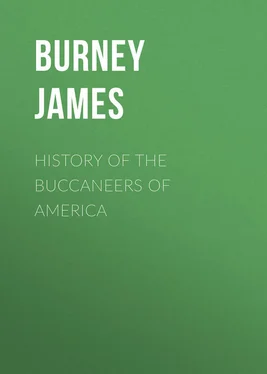James Burney - History of the Buccaneers of America
Здесь есть возможность читать онлайн «James Burney - History of the Buccaneers of America» — ознакомительный отрывок электронной книги совершенно бесплатно, а после прочтения отрывка купить полную версию. В некоторых случаях можно слушать аудио, скачать через торрент в формате fb2 и присутствует краткое содержание. Жанр: foreign_antique, foreign_prose, на английском языке. Описание произведения, (предисловие) а так же отзывы посетителей доступны на портале библиотеки ЛибКат.
- Название:History of the Buccaneers of America
- Автор:
- Жанр:
- Год:неизвестен
- ISBN:нет данных
- Рейтинг книги:4 / 5. Голосов: 1
-
Избранное:Добавить в избранное
- Отзывы:
-
Ваша оценка:
- 80
- 1
- 2
- 3
- 4
- 5
History of the Buccaneers of America: краткое содержание, описание и аннотация
Предлагаем к чтению аннотацию, описание, краткое содержание или предисловие (зависит от того, что написал сам автор книги «History of the Buccaneers of America»). Если вы не нашли необходимую информацию о книге — напишите в комментариях, мы постараемся отыскать её.
History of the Buccaneers of America — читать онлайн ознакомительный отрывок
Ниже представлен текст книги, разбитый по страницам. Система сохранения места последней прочитанной страницы, позволяет с удобством читать онлайн бесплатно книгу «History of the Buccaneers of America», без необходимости каждый раз заново искать на чём Вы остановились. Поставьте закладку, и сможете в любой момент перейти на страницу, на которой закончили чтение.
Интервал:
Закладка:
It is not to be urged in exculpation of the Spaniards, that the natives were the aggressors, by their killing the garrison left at Hayti . Columbus had terminated his first visit in friendship; and, without the knowledge that any breach had happened between the Spaniards left behind, and the natives, sentence of subjugation had been pronounced against them. This was not to avenge injury, for the Spaniards knew not of any committed. Columbus was commissioned to execute this sentence, and for that end, besides a force of armed men, he took with him from Spain a number of blood-hounds, to prosecute a most unrighteous purpose by the most inhuman means.
Many things are justifiable in defence, which in offensive war are regarded by the generality of mankind with detestation. All are agreed in the use of dogs, as faithful guards to our persons as well as to our dwellings; but to hunt men with dogs seems to have been till then unheard of, and is nothing less offensive to humanity than cannibalism or feasting on our enemies. Neither jagged shot, poisoned darts, springing of mines, nor any species of destruction, can be objected to, if this is allowed in honourable war, or admitted not to be a disgraceful practice in any war.
It was scarcely possible for the Indians, or indeed for any people naked and undisciplined, however numerous, to stand their ground against a force so calculated to excite dread. The Islanders were naturally a timid people, and they regarded fire-arms as engines of more than mortal contrivance. Don Ferdinand, the son of Columbus, who wrote a History of his father's actions, relates an instance, which happened before the war, of above 400 Indians running away from a single Spanish horseman. Massacre of the Natives, and Subjugation of the Island. So little was attack, or valiant opposition, apprehended from the natives, that Columbus divided his force into several squadrons, to charge them at different points. 'These faint-hearted creatures,' says Don Ferdinand, 'fled at the first onset; and our men, pursuing and killing them, made such havock, that in a short time they obtained a complete victory.' The policy adopted by Columbus was, to confirm the natives in their dread of European arms, by a terrible execution. The victors, both dogs and men, used their ascendancy like furies. The dogs flew at the throats of the Indians, and strangled or tore them in pieces; whilst the Spaniards, with the eagerness of hunters, pursued and mowed down the unresisting fugitives. Some thousands of the Islanders were slaughtered, and those taken prisoners were consigned to servitude. If the fact were not extant, it would not be conceivable that any one could be so blind to the infamy of such a proceeding, as to extol the courage of the Spaniards on this occasion, instead of execrating their cruelty. Three hundred of the natives were shipped for Spain as slaves, and the whole Island, with the exception of a small part towards the Western coast, which has since been named the Cul de Sac , was subdued. Tribute imposed. Columbus made a leisurely progress through the Island, which occupied him nine or ten months, and imposed a tribute generally upon all the natives above the age of fourteen, requiring each of them to pay quarterly a certain quantity of gold, or 25 lbs. of cotton. Those natives who were discovered to have been active against the Spaniards, were taxed higher. To prevent evasion, rings or tokens, to be produced in the nature of receipts, were given to the Islanders on their paying the tribute, and any Islander found without such a mark in his possession, was deemed not to have paid, and proceeded against.
Queen Ysabel shewed her disapprobation of Columbus's proceedings, by liberating and sending back the captive Islanders to their own country; and she moreover added her positive commands, that none of the natives should be made slaves. This order was accompanied with others intended for their protection; but the Spanish Colonists, following the example of their Governor, contrived means to evade them.
In the mean time, the Islanders could not furnish the tribute, and Columbus was rigorous in the collection. It is said in palliation, that he was embarrassed in consequence of the magnificent descriptions he had given to Ferdinand and Ysabel, of the riches of Hispaniola , by which he had taught them to expect much; and that the fear of disappointing them and losing their favour, prompted him to act more oppressively to the Indians than his disposition otherwise inclined him to do. Distresses of this kind press upon all men; but only in very ordinary minds do they outweigh solemn considerations. Setting aside the dictates of religion and moral duty, as doubtless was done, and looking only to worldly advantages, if Columbus had properly estimated his situation, he would have been resolute not to descend from the eminence he had attained. The dilemma in which he was placed, was simply, whether he would risk some diminution of the favour he was in at Court, by being the protector of these Islanders, who, by circumstances peculiarly calculated to engage his interest, were entitled in an especial manner to have been regarded as his clients; or, to preserve that favour, would oppress them to their destruction, and to the ruin of his own fame.
Despair of the Natives. The Islanders, finding their inability to oppose the invaders, took the desperate resolution to desist from the cultivation of their lands, to abandon their houses, and to withdraw themselves to the mountains; hoping thereby that want of subsistence would force their oppressors to quit the Island. The Spaniards had many resources; the sea-coast supplied them with fish, and their vessels brought provisions from other islands. As to the natives of Hayti , one third part of them, it is said, perished in the course of a few months, by famine and by suicide. The rest returned to their dwellings, and submitted. All these events took place within three years after the discovery; so active is rapacity.
Some among the Spaniards (authors of that time say, the enemies of Columbus, as if sentiments of humanity were not capable of such an effort) wrote Memorials to their Catholic Majesties, representing the disastrous condition to which the natives were reduced. 1496. Commissioners were sent to examine into the fact, and Columbus found it necessary to go to Spain to defend his administration.
So great was the veneration and respect entertained for him, that on his arrival at Court, accusation was not allowed to be produced against him: and, without instituting enquiry, it was arranged, that he should return to his government with a large reinforcement of Spaniards, and with authority to grant lands to whomsoever he chose to think capable of cultivating them. Various accidents delayed his departure from Spain on his third voyage, till 1498.
City of Nueva Ysabel founded, 1496. He had left two of his brothers to govern in Hispaniola during his absence; the eldest, Bartolomé, with the title of Adelantado; in whose time (A. D. 1496) was traced, on the South side of the Island, the plan of a new town intended for the capital, the land in the neighbourhood of the town of Ysabel , before built, being poor and little productive. Its name changed to Santo Domingo. The name first given to the new town was Nueva Ysabel ; this in a short time gave place to that of Santo Domingo , a name which was not imposed by authority, but adopted and became in time established by common usage, of which the original cause is not now known 2 2 The name Saint Domingo was afterwards applied to the whole Island by the French, who, whilst they contested the possession with the Spaniards, were desirous to supersede the use of the name Española or Hispaniola .
.
Under the Adelantado's government, the parts of the Island which till then had held out in their refusal to receive the Spanish yoke, were reduced to subjection; and the conqueror gratified his vanity with the public execution of one of the Hayti Kings.
Читать дальшеИнтервал:
Закладка:
Похожие книги на «History of the Buccaneers of America»
Представляем Вашему вниманию похожие книги на «History of the Buccaneers of America» списком для выбора. Мы отобрали схожую по названию и смыслу литературу в надежде предоставить читателям больше вариантов отыскать новые, интересные, ещё непрочитанные произведения.
Обсуждение, отзывы о книге «History of the Buccaneers of America» и просто собственные мнения читателей. Оставьте ваши комментарии, напишите, что Вы думаете о произведении, его смысле или главных героях. Укажите что конкретно понравилось, а что нет, и почему Вы так считаете.












